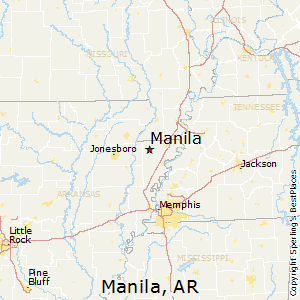
Manila Museum
Manila is located on Buffalo Island, not really an island but a geographical piece of land bordered by the Little River and Big Lake. The history of the town dates to just after the Civil War when John U. Needham came to the Manila area in 1868 to establish a permanent camp for his grazing stock. He selected the highest, driest piece of the land that was in an area that at the time was called the “Great Swamp.” A community, named Cinda after Lucinda, a postmaster’s sister, grew in the area of Needham homestead. In 1901 the community incorporated as a town with the name of Manila after the capitol of the Philippine Islands in honor of Admiral George Dewey’s accomplishments during the Spanish-American War and his decisive victory at the Battle of Manila Bay.
By this time the extensive timber tracts in the area attracted the attention of the railroads companies where substantial profits could be made from shipments of timber to area sawmills and then to northern markets. The town grew rapidly when the Jonesboro, Lake City and Eastern (JLC&E) extended its line to Manila on December 2, 1900. The JLC&E operated four trains daily until 1938, when it sold to the Saint Louis and San Francisco Railroad Company. Passenger and mail service was discontinued in 1948 and from then on the railroad has been used only for freight shipments. The town’s depot was built in 1910 and closed in 1977. Twenty years later a group of volunteers called the Manila Depot Committee, with the support of the city of Manila, had the building renovated to its original state and turned it into a museum housing antique items and memorabilia for future generations to view. In the same year the Manila Depot was placed on the National Historic Register on March 8, 1997.

Big Lake National Wildlife Refuge
Living in close proximity of the Mississippi River has been both a blessing and a curse for the people of Manila. Thousands of years of flooding made the rich alluvial soil excellent for growing crops; however, the periodic floods can cause great damage to the community. The first levee around Manila was built by 1920 but failed during the devastating Flood of 1927 and again in 1937 flood. The U.S. Corps of Engineers built the present levees around Big Lake in 1938. Big Lake is one of Manila’s biggest attractions. Located just four miles southeast of town on AR-18., The site is home to Big Lake National Wildlife Refuge and Big Lake Wild Life Management Area. Since its earliest days, the Manila area has been known for its abundance of wild game and fish. An early area industry used the railroad to ship huge quantities of fur, fish, and game to markets outside the state. This practice came to an end when locals such as plantation owner Robert E. Lee Wilson and others who had hunting clubs on Big Lake persuaded U.S. President Woodrow Wilson to designate the area a Federal Game Reserve in 1915. Big Lake National Wildlife Refuge has an interpretive center dedicated to wildlife on the grounds just off the highway.
Manila is home to Arkansas’ smallest state park. Herman Davis State Park honors Private Herman Davis, a native of Manila who is considered one of the top heroes of World War I by distinguishing himself with unusual feats of bravery on more than one occasion. After his death in 1923, Mississippi County raised $5,000 for the monument in Manila, where the city had donated a site. The monument is an imposing twenty-five-foot-tall Barre granite obelisk with a life-sized statue of Davis made from Italian marble resting at its base. The memorial site has off-street parking areas, sidewalks, and park benches and is fully accessible to all visitors.
Source: https://www.greatriverroad.com/manila-ar
Meanwhile enjoy this recent photo of my lighted Bubblegram



No comments:
Post a Comment